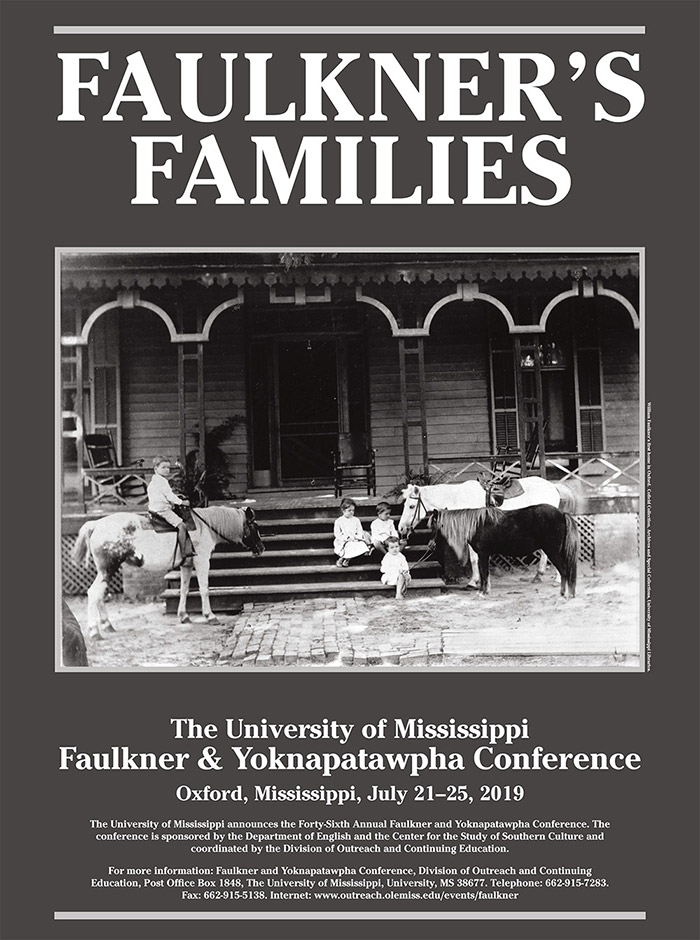
Panel. Affinities and Affiliations, Familial and Otherwise
Location
Nutt Auditorium
Start Date
22-7-2019 9:30 AM
Description
- Reading Like a Buzzard: Circling the Woman-Animal in Faulkner’s Archive / Sage Gerson, University of California, Santa Barbara
- Under Construction: False Memories and Conditional Identities in Light in August / Aili Pettersson Peeker, University of California, Santa Barbara
Incorporating contemporary cognitive neuroscience research to understand the construction of memory, this paper explores the complex entanglement of storytelling and memory to show how the construction of race in Light in August is inextricably linked to an epistemological uncertainty underscored by Faulkner’s use of conditional narration. Taking seriously the idea that we can and do create memories of events that never occurred and that these so-called false memories can change the material of both brain and life, it traces Faulkner’s revisions of Light in August and argues that Joe Christmas’ racial identity can be read as founded upon false memories. This reading highlights how Faulkner’s narrative strategies question the authority of narrativized memory. - Materializing Race through Lena’s Maternal Body in Light in August / Maite Urcaregui, University of California, Santa Barbara
This paper explores the uneasy entanglements of race, gender, and sexuality in William Faulkner’s Light in August. I first investigate how Faulkner’s framing of Christmas’ narrative within Lena’s journey structurally enacts the way the white female maternal body comes to circumscribe Joe, in terms of both the novel’s form and its negotiation of the discursive construction of race and its material consequences. I then draw extensively on the revisions in Faulkner’s autograph manuscript to investigate other moments where Joe’s racial “identity” comes to the fore as it is positioned against white women’s sexuality, or rather as it threatens what white men have come to associate with property and racial hierarchy. My project draws on archival evidence to argue that Light in August’s narrative structure enacts, questions, critiques, and at times reinforces these structural entanglements, ultimately, granting Lena mobility within them and forcing Joe to run a dead-end street. - “The American Tale of Terror”: Construction of Identity and Kinship in Absalom, Absalom! / Madeleine Roepe, University of California, Santa Barbara
Relational Format
Conference proceeding
Recommended Citation
Gerson, Sage; Peeker, Aili Pettersson; Urcaregui, Maite; and Roepe, Madeleine, "Panel. Affinities and Affiliations, Familial and Otherwise" (2019). Faulkner and Yoknapatawpha Conference. 8.
https://egrove.olemiss.edu/fy/2019/schedule/8
COinS
Jul 22nd, 9:30 AM
Panel. Affinities and Affiliations, Familial and Otherwise
Nutt Auditorium
- Reading Like a Buzzard: Circling the Woman-Animal in Faulkner’s Archive / Sage Gerson, University of California, Santa Barbara
- Under Construction: False Memories and Conditional Identities in Light in August / Aili Pettersson Peeker, University of California, Santa Barbara
Incorporating contemporary cognitive neuroscience research to understand the construction of memory, this paper explores the complex entanglement of storytelling and memory to show how the construction of race in Light in August is inextricably linked to an epistemological uncertainty underscored by Faulkner’s use of conditional narration. Taking seriously the idea that we can and do create memories of events that never occurred and that these so-called false memories can change the material of both brain and life, it traces Faulkner’s revisions of Light in August and argues that Joe Christmas’ racial identity can be read as founded upon false memories. This reading highlights how Faulkner’s narrative strategies question the authority of narrativized memory. - Materializing Race through Lena’s Maternal Body in Light in August / Maite Urcaregui, University of California, Santa Barbara
This paper explores the uneasy entanglements of race, gender, and sexuality in William Faulkner’s Light in August. I first investigate how Faulkner’s framing of Christmas’ narrative within Lena’s journey structurally enacts the way the white female maternal body comes to circumscribe Joe, in terms of both the novel’s form and its negotiation of the discursive construction of race and its material consequences. I then draw extensively on the revisions in Faulkner’s autograph manuscript to investigate other moments where Joe’s racial “identity” comes to the fore as it is positioned against white women’s sexuality, or rather as it threatens what white men have come to associate with property and racial hierarchy. My project draws on archival evidence to argue that Light in August’s narrative structure enacts, questions, critiques, and at times reinforces these structural entanglements, ultimately, granting Lena mobility within them and forcing Joe to run a dead-end street. - “The American Tale of Terror”: Construction of Identity and Kinship in Absalom, Absalom! / Madeleine Roepe, University of California, Santa Barbara

